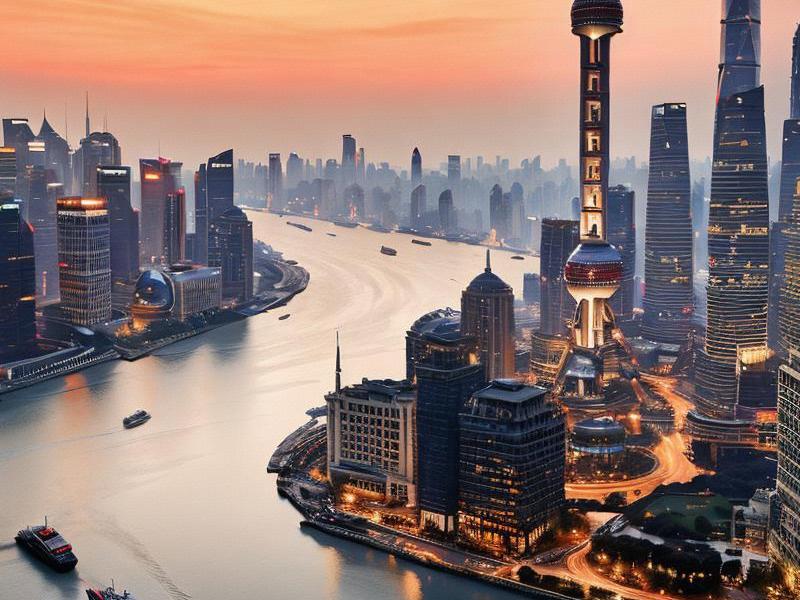This article delves into the multifaceted character of Shanghai, exploring its evolution from a small fishing village to a global metropolis that stands as a beacon of the Orient. It examines the city's rapid urban development, the harmonious fusion of diverse cultures, and its pivotal role as an economic powerhouse in China and beyond.

Nestled along the banks of the Huangpu River, Shanghai is a city that has witnessed the ebb and flow of history, emerging as one of the most dynamic and influential cities in the world. Once a modest fishing village, Shanghai has transformed into a sprawling metropolis, renowned for its iconic skyline, vibrant culture, and economic prowess.
The journey of Shanghai from a small settlement to a global city is nothing short of remarkable. In the 19th century, the city became a treaty port following the First Opium War, which opened it up to foreign trade and influence. This period of opening up brought about a wave of Westernization, with the construction of grand buildings, the establishment of international concessions, and the influx of foreign businesses. These developments laid the foundation for Shanghai's transformation into a cosmopolitan city.
Today, Shanghai is a symbol of China's rapid urbanization and economic growth. The city's skyline is a testament to its modernity, with towering skyscrapers like the Shanghai Tower, the Jin Mao Tower, and the Oriental Pearl Tower. These architectural marvels not only showcase Shanghai's economic strength but also serve as a hub for global business and finance.
The urban development of Shanghai is characterized by its innovative approach to city planning and infrastructure. The city has invested heavily in public transportation, with an extensive network of metro lines, buses, and ferries that connect its various districts. This efficient transportation system not only facilitates the movement of people and goods but also promotes sustainable urban living.
爱上海419论坛 Shanghai's cultural fusion is one of its most defining features. The city is a melting pot of Chinese and Western cultures, reflecting its history as a meeting point of different civilizations. This cultural diversity is evident in the city's architecture, cuisine, art, and festivals. The Bund, a historic waterfront area, is a prime example of this cultural blend, with its juxtaposition of colonial-era buildings and the modern skyline of Pudong.
The city's cuisine is a delightful mix of traditional Shanghai flavors and international dishes. From the famous xiaolongbao (soup dumplings) to the sophisticated French and Italian cuisine found in its many restaurants, Shanghai offers a culinary experience that caters to all tastes. The city's art scene is equally vibrant, with galleries, theaters, and cultural institutions showcasing both traditional Chinese art and contemporary works from around the world.
Shanghai's role as an economic hub is unparalleled. It is the financial center of China, home to the Shanghai Stock Exchange, one of the largest stock exchanges in the world. The city is also a major hub for trade and manufacturing, with its port being one of the busiest in the world. This economic powerhouse status has attracted businesses and investors from around the globe, contributing to Shanghai's global influence.
The city's economic success is not without its challenges. As Shanghai continues to grow, it faces issues such as urban sprawl, environmental concerns, and social inequality. However, the city has demonstrated a commitment to sustainable development, with initiatives aimed at reducing pollution, promoting green spaces, and improving the quality of life for its residents.
上海龙凤sh419
One of the most ambitious projects in Shanghai is the construction of the Hongqiao Economic Zone, which aims to integrate transportation, commerce, and living spaces in a sustainable manner. This project reflects Shanghai's vision of becoming a global city that balances economic growth with environmental sustainability.
Shanghai's cultural scene is further enriched by its numerous festivals and events. The Shanghai International Film Festival, one of the oldest and most prestigious film festivals in Asia, attracts filmmakers and audiences from around the world. The city's art festivals, such as the Shanghai Biennale, showcase contemporary art and foster cultural exchange.
The city's commitment to education and innovation is also noteworthy. Shanghai is home to some of the top universities in China, including Fudan University and Tongji University, which attract students from around the globe. The city's research institutions and technology parks are at the forefront of innovation, driving advancements in fields such as artificial intelligence, biotechnology, and green energy.
419上海龙凤网 Shanghai's international profile continues to grow, with the city playing host to numerous international events and summits. It is a member of the World Expo Organizing Committee and has hosted major events such as the APEC Leaders' Meeting and the G20 Summit. These events highlight Shanghai's role as a global city and its ability to attract international attention and collaboration.
The city's residents are a testament to Shanghai's diversity and vibrancy. With a population of over 24 million, Shanghai is home to people from all walks of life, speaking a variety of languages and practicing different cultures. This diversity is a source of strength for the city, contributing to its creativity, resilience, and global outlook.
In conclusion, Shanghai stands as a beacon of the Orient, a city that embodies the spirit of modernity, cultural fusion, and economic prosperity. Its journey from a small fishing village to a global metropolis is a story of transformation and success, offering valuable lessons in urban development and cultural integration. As Shanghai continues to evolve, it remains a symbol of China's aspirations and a model for other cities around the world.